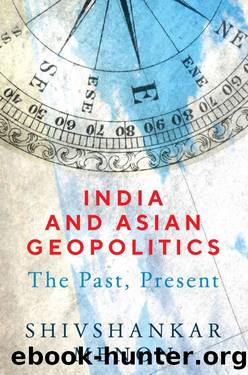India and Asian Geopolitics by Shivshankar Menon

Author:Shivshankar Menon [Menon, Shivshankar]
Language: eng
Format: epub
ISBN: 9780815737230
Publisher: Brookings Institution Press
Published: 2021-04-19T22:00:00+00:00
8
The Globalization Decades
If the Narasimha Rao government seized the opportunity created by the transitions of the early 1990s to reform the economy and to chart a new foreign policy, the subsequent governments of Atal Behari Vajpayee and Manmohan Singh explored the advantages of a globalizing world and of an international order dominated by a single superpower, the United States, until the global financial crisis of 2008 changed the situation again.
In these years the American neoliberal project, which advocated market fundamentalism (as opposed to a Keynesian approach) and unfettered financial markets, coincided with unrivalled American political and military dominance in the world. This new approach was very different from the post-World War II economic order built by the United States. The institutions set up at the Bretton Woods meetings such as the World Bank and International Monetary Fund and the subsequent General Agreement on Trade and Tariffs sought to implement lessons learned from the Great Depression and World War II. Then, it was understood that unrestrained market forces could generate economic and social distress. The first postwar order was primarily informed by economist David Keynesâs ideas, embracing but mediating market forces so that individual states could pursue domestic political and social agendas of their own as they saw fit. One economist called the approach the âcompromise of embedded liberalism.â The critique of Keynes came in the form of new classical macroeconomics and the theory of rational expectations championed by economists such as Robert Lucas and Thomas Sargent. Their theory of rational expectations implied âpolicy ineffectiveness,â namely, that there was little that governments can do to influence the economy at all except inefficiently get in the way. From the anti-Keynesian perspective financial markets always know best and should be left to supervise themselves.
The second order, instituted after the Cold War, was anti-Keynesian and constituted a financial liberalization project not just for the United States but for all the world. The dismantling of capital controls led to increasing financial instability, as was evident in the Asian financial crisis of 1997â1998, which planted seeds of doubt in Asian minds and ultimately delegitimized the second U.S. order, as did the success of nonmarket economies such as China.
Download
This site does not store any files on its server. We only index and link to content provided by other sites. Please contact the content providers to delete copyright contents if any and email us, we'll remove relevant links or contents immediately.
| Elections & Political Process | Ideologies & Doctrines |
| International & World Politics | Political Science |
| Public Affairs & Policy | Specific Topics |
| United States |
The Secret History by Donna Tartt(16623)
The Social Justice Warrior Handbook by Lisa De Pasquale(11489)
Thirteen Reasons Why by Jay Asher(7788)
This Is How You Lose Her by Junot Diaz(5772)
Weapons of Math Destruction by Cathy O'Neil(5037)
Zero to One by Peter Thiel(4824)
The Myth of the Strong Leader by Archie Brown(4789)
Promise Me, Dad by Joe Biden(4447)
Beartown by Fredrik Backman(4419)
Stone's Rules by Roger Stone(4415)
How Democracies Die by Steven Levitsky & Daniel Ziblatt(4399)
The Fire Next Time by James Baldwin(4343)
100 Deadly Skills by Clint Emerson(4078)
A Higher Loyalty: Truth, Lies, and Leadership by James Comey(4033)
Rise and Kill First by Ronen Bergman(4012)
The David Icke Guide to the Global Conspiracy (and how to end it) by David Icke(3882)
The Farm by Tom Rob Smith(3872)
Secrecy World by Jake Bernstein(3782)
The Doomsday Machine by Daniel Ellsberg(3731)
